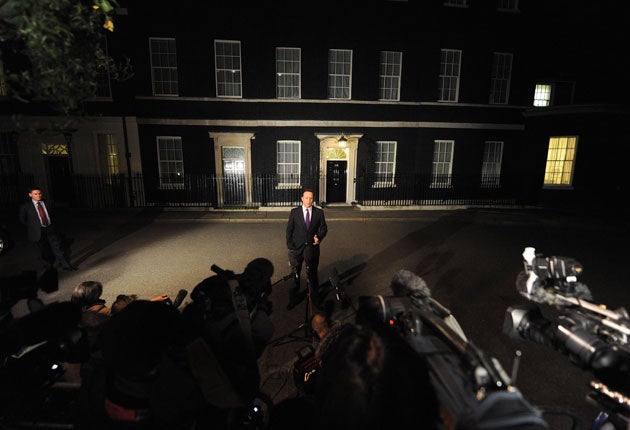Royal Navy fires cruise missiles at key Libyan targets
UK ships and aircraft spearhead Operation Odyssey Dawn

Your support helps us to tell the story
From reproductive rights to climate change to Big Tech, The Independent is on the ground when the story is developing. Whether it's investigating the financials of Elon Musk's pro-Trump PAC or producing our latest documentary, 'The A Word', which shines a light on the American women fighting for reproductive rights, we know how important it is to parse out the facts from the messaging.
At such a critical moment in US history, we need reporters on the ground. Your donation allows us to keep sending journalists to speak to both sides of the story.
The Independent is trusted by Americans across the entire political spectrum. And unlike many other quality news outlets, we choose not to lock Americans out of our reporting and analysis with paywalls. We believe quality journalism should be available to everyone, paid for by those who can afford it.
Your support makes all the difference.A Royal Navy submarine launched Tomahawk cruise missiles at key air defences across Libya last night in the first of a wave of attacks by British forces aimed at enforcing a no-fly zone.
A Trafalgar-class submarine, which had been secretly on standby in the Mediterranean for several days, began firing on radar bases, surface-to-air sites and infrastructure related to air defence. The co-ordinated strike was part of the UN-backed offensive that saw 112 cruise missiles rain down on the troubled state. The Libyan capital, Tripoli, where Colonel Muamar Gaddafi is known to be hiding out, was targeted.
British planes were also understood to have been in action last night, as French jets carried out sorties across the north of the country, destroying tanks and other armaments. RAF Typhoon and Tornado fast fighter jets and bombers are thought to be involved in the mission beside surveillance aircraft and air-to-air refuelling planes.
David Cameron chaired a meeting of the Cobra emergency committee before confirming the involvement of British forces as "part of an international coalition that has come together to enforce the will of the United Nations and to support the Libyan people". In a statement in Downing Street, he defended the mission after Gaddafi "stepped up the attacks and the brutality". The PM also paid tribute to members of the armed forces who were acting "in our nation's interest".
In a carefully co-ordinated joint operation between the UK, the US, France, Spain and Canada, more than 20 air defence systems on or near the coast were hit.
Barack Obama used a radio address to defend the US joining another military operation. "The use of force is not our first choice or a choice I made lightly," the President said. "But we can't stand idly by when a tyrant tells his people that there will be no mercy."
World leaders have been at pains to emphasise that the intervention has clear aims, and is not an Iraq-style occupation. Ban Ki-Moon, the UN Secretary General, said: "Arab countries, Europeans, Americans – they were all in one voice."
But a spokesman for the Libyan government condemned the attacks on his country as "barbaric". He said rocket attacks had been launched on "several locations" including Tripoli and Misrata despite the Libyan authorities' announcement of a ceasefire, and claimed many civilians had been injured.
The Al Jazeera Network confirmed that a British journalist, Kamel Atalua, was among four staff held by Libyan authorities in Tripoli. He was held with fellow cameraman Ammar al-Hamdan and correspondents Lotfi al-Messaoudi and Ahmed Vall Ould Addin.
Join our commenting forum
Join thought-provoking conversations, follow other Independent readers and see their replies
Comments